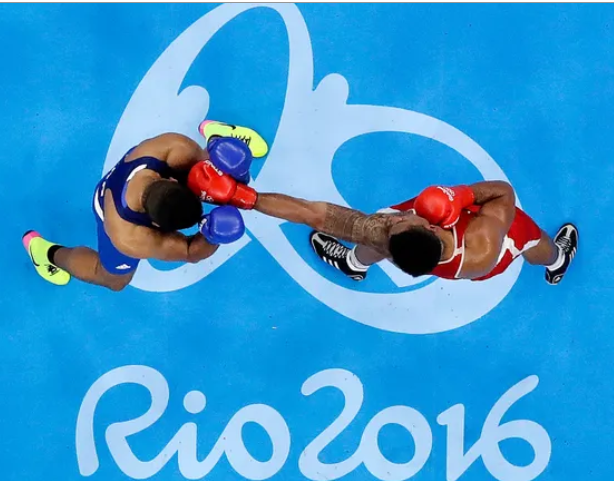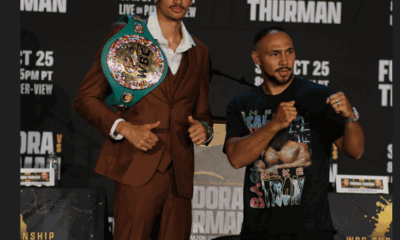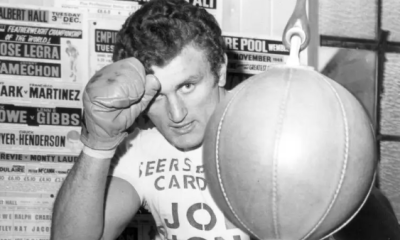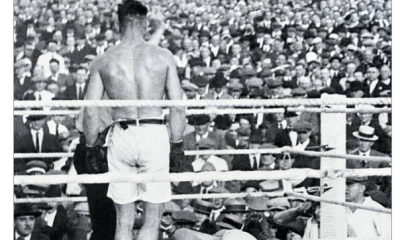Featured Articles
AIBA Confirms Corruption at 2016 Rio Olympics; in Other News, Water is Wet

It has been said that it’s difficult, almost impossible even, to refute something you see with your own eyes. But the validity of the eye test carried little to no weight during the scandal-soiled boxing competition at the 2016 Rio de Janeiro Olympics, where what everyone saw was not always what everyone got. Two prime examples of the proof that corruption in Olympic boxing rings was again rampant were the gold medal that was awarded to Russian heavyweight Evengy Tischenko over far more deserving Vassiliy Levit of Kazakhstan and a hotly disputed early-round decision that went to another Russian, Vladimir Tikitin, over top-seeded bantamweight Michael Conlan of Ireland. Tikitin eventually came away with a bronze medal, but an enraged Conlan’s Olympic journey ended in bitterness.
“They’re cheating bastards,” Conlan, who reacted to his announced defeat by flashing one-finger salutes to offending ringside officials assigned by the International Boxing Association (AIBA), the much-maligned governing body for Olympic boxing. “They’re paying everybody. They’ve always been cheats. It’s a shambles, to be honest. Today just showed how corrupt this organization is.”
In indignant reaction to the complaints of Levit, Conlan and others who seemingly had had their bouts judged by officials who either were incompetent or complicit in skullduggery, the AIBA issued a statement that read: With regard to corruption, we would like to strongly restate that unless tangible proof is put forward, not rumors, we will continue to use any means, including legal or disciplinary actions, to protect our sport and its R&J (Referees and Judges) community, whose integrity is constantly put into question. The organization will not be deterred by subjective judgments made by discontented parties.
Five years later, some measure of delayed justice for wronged parties in Rio, who had ample reason to be discontented, was delivered in what was termed an independent report authored by Western Ontario University law professor Richard McLaren. The prof’s company had been hired by AIBA to ascertain, as best it could, whether what appeared to be an overflowing toilet of malfeasance needed to be spiffed up with a Tidy Bowl tablet and a bit of air freshener. Not that any forthcoming adjustments will alter the results of Rio 2016 for Levit, Conlan and other victims in the Legion of the Screwed. Those outcomes are in the books and forever confirmed for posterity’s sake, all eye tests to the contrary notwithstanding.
Owning up to one Olympiad’s worth of rotten officiating, the AIBA issued another statement, this one conceding that the McLaren group’s findings were being viewed “with concern” and that “extensive reforms have been implemented to ensure sporting integrity at current AIBA competitions.” It went on to state that McLaren will probe “not only the 2016 Rio boxing tournament but also all key events until now to reach full transparency.”
It is commendable that AIBA is finally shining an unfavorable light upon itself, but it is akin to opening the barn door after a raging fire has burned down the remainder of the structure. The International Olympic Committee, which has a few skeletons in its own closet, removed AIBA’s governance of the boxing tournament at the 2020 Tokyo Olympics (actually staged this year because of COVID-19 concerns) amid all the bad vibes that seemed to be intensifying. It can be argued that AIBA, its absolute control of Olympic boxing slip-sliding away, has been dragged kicking and screaming into doing the right thing on the premise that some of whatever validity it once had might be salvageable going forward.
But it might be a case of too little and too late, and that is even if there is some degree of certainty that the current top administrators of AIBA – Russia’s Umar Kremlev has been its president since 2020 – can pump out the flooded areas of a ship that, in some astute observers’ estimation, has been incrementally sinking at least since the 1988 Seoul Olympics. There is a school of thought that the IOC might simply excise a problem sport that has been a part of the Olympic movement since the 2004 St. Louis Olympics prior to the 2024 Paris Games.
Legendary trainer Emanuel Steward, who was 68 when he died on Oct. 25, 2012, spent only one dissatisfying year as USA Boxing’s director of coaching before he stepped down in the early 2000s from what he perceived to be a mostly ornamental position.
“Are we prepared to just walk away? I don’t know,” Steward said of the possibility that the United States might become so disillusioned with the Olympics, or at least Olympic boxing, that the country might simply step away from the quadrennial event. “I do know that Olympic boxing is not what it used to be, and nobody in America is in agreement on what they want to do.
“To me, it’s been steadily declining since 1988. I don’t even have my amateur kids today pointing toward the Olympics. When I started coaching in 1961, that was everyone’s dream. It was my dream to make the Olympic team in 1964. Your first thought was trying to go to the Olympics, then you worried about turning professional.”
Steward’s mention of 1988 as the possible genesis of what has become a downward spiral is telling. It was at the Seoul Olympics that year that America’s 156-pound representative, Roy Jones Jr. – you might have heard of him – was on the short end of what arguably has been the most egregiously unjust result in the history of Olympic boxing. Jones battered his South Korean opponent, Park Si-Hun, from pillar to post from the opening bell to the end of the scheduled three-rounder, only to be stunned when the judges voted 3-2 that the gold medal should go to the home-nation fighter. That result continues to stand, although a consolation prize, the Val Barker Trophy as the Seoul Olympics’ “most outstanding boxer,” went to Jones.
If the shafting of Jones is the most obvious example of any funny business being done in ’88, succeeding Olympics offered evidence of the increasing brazenness of AIBA presidents Dr. Anwar Chowdhry of Pakistan (now deceased) and Dr. Ching-Kuo Wu of Chinese Taipei. Chowdhry remained in the top spot for a quarter-century until being voted out and replaced by Wu, who promised sweeping reforms, in 2006. If there were such reforms made, however, they were not evident to Teddy Atlas, who was the analyst for NBC’s coverage of four Olympiads (2000, 2004, 2008 and 2012). The unapologetically blunt Atlas was not retained in that position in 2016, possibly because he tends to speak the truth as he sees it and is not disposed to gloss over controversies.
Prior to the London Olympics, there had been a British Broadcasting Corporation report the previous September that Azerbaijan, an oil- and mineral-rich satellite country of the old Soviet Union, was prepared to pay millions of dollars to “buy” two gold medals in boxing. The BBC report found documents showing that a $9 million bank transfer, funneled through Switzerland, where AIBA is headquartered, went to a boxing organization owned by AIBA. Atlas mentioned the existence of the report to the American TV audience, but did not state whether it had validity since no certifiably provable links to wrongdoing had been established.
But if anyone needed a large mound of circumstantial evidence to ascertain that something indeed was amiss, it was presented when Atlas and broadcasting partner Bob Papa were calling a match during which a Japanese boxer, Satoshi Shimisu, knocked down Azerbaijan’s Magomed Abdulhamidev seven times, but amazingly, “the Azerbaijan guy’s point total kept going up!,” Atlas said for a 5,000-word story I did for this site that first appeared online on Aug. 25, 2016. “Bob and I were, like, `Can they really be this arrogant? This cold, this uncaring? Don’t these people have any sense of right and wrong, that they can do this before the entire world?’” It hardly seemed to matter much that Japan’s protest on Shimisu’s behalf was upheld in the face of vehement and widespread public outrage.
Fixing Olympic boxing, and maybe even the Olympics as a whole, may require more than a squeegee and a bucket of soapy water. The McLaren Report indicated its investigation focused primarily on Rio in 2016 (there also were signs the 2012 London Olympiad was affected) and any international tournaments since, but to appreciate the full scope of all that was subverted requires a longer, more thorough look at the multiple stains accumulated at least since 1988, and maybe even before then. There is a reason why Olympic boxing, the sport that first brought such luminaries as Cassius Clay, Joe Frazier, Sugar Ray Leonard, George Foreman, Oscar De La Hoya and others to prominence, no longer merits prime-time exposure on NBC, instead being shuttled off to alternative, little-viewed TV outlets. There is also a reason why more and more young fighters, not just Americans, are turning pro earlier instead of hanging around to pursue Olympic dreams that are no longer quite so enticing.
“Key personnel decided that the rules did not apply to them,” McLaren determined, adding that there was a “culture of fear, intimidation and obedience in the ranks of referees and judges.” He further noted that senior AIBA officials used their power to select referees and judges and turned the commission, which was supposed to ensure they were assigned fairly, into “a mere rubber stamp … to ensure the manipulation of outcomes.”
Perhaps the current AIBA president, Kremlev, will have the resources and will to cleanse all or most of his organization’s blight. Not that anyone’s nationality should be held against them, but being a Russian might not be construed as a positive now insofar as the Olympics and particularly AIBA are concerned. The 2014 Winter Olympics, President Vladimir Putin’s pet project, were staged in Sochi, Russia, and were the costliest ever with a price tag of $51 billion. It later was ascertained that nearly every Russian competitor in Sochi had benefited from the administering of state-sanctioned performance enhancing drugs. Make of that what you will, or that Putin and his “good friend,” IOC President Thomas Bach of Germany, were seated together at ringside for Tischenko’s gift decision over Levit in Rio, a miscarriage of justice almost on the level of Si-Hun over Jones in 1988. Neither man seemed surprised nor concerned about the dubious outcome.
“AIBA hired Professor McLaren because we have nothing to hide,” Kremlev indicated in a statement. “We will work to incorporate any helpful recommendations that are made. We will also take legal advice with regard to what action is possible against those found to have participated in any manipulation. There should be no place in the AIBA family for anyone who has fixed a fight.”
Encouraging words to be sure, but we have repeatedly heard more or less the same tune in the past. The question is, will Olympic boxing actually be able to dance to it instead of stumbling over its own feet?
Editor’s Note: Bernard Fernandez, named to the International Boxing Hall of Fame in the Observer category with the class of 2020, was the recipient of numerous awards for writing excellence during his 28-year career as a sportswriter for the Philadelphia Daily News. Fernandez’s first book, “Championship Rounds,” a compendium of previously published material, was released in May of last year. The sequel, “Championship Rounds, Vol. 2,” with a foreword by Jim Lampley, arrives this fall. The book can be ordered through Amazon.com, in hard or soft cover, and other book-selling websites and outlets.
Check out more boxing news on video at the Boxing Channel
To comment on this story in the Fight Forum CLICK HERE
-

 Book Review4 weeks ago
Book Review4 weeks agoMark Kriegel’s New Book About Mike Tyson is a Must-Read
-

 Featured Articles3 weeks ago
Featured Articles3 weeks agoThe Hauser Report: Debunking Two Myths and Other Notes
-

 Featured Articles3 weeks ago
Featured Articles3 weeks agoMoses Itauma Continues his Rapid Rise; Steamrolls Dillian Whyte in Riyadh
-

 Featured Articles3 weeks ago
Featured Articles3 weeks agoNikita Tszyu and Australia’s Short-Lived Boxing Renaissance
-

 Featured Articles4 weeks ago
Featured Articles4 weeks agoKotari and Urakawa – Two Fatalities on the Same Card in Japan: Boxing’s Darkest Day
-

 Featured Articles3 weeks ago
Featured Articles3 weeks agoIs Moses Itauma the Next Mike Tyson?
-

 Featured Articles2 weeks ago
Featured Articles2 weeks agoBoxing Odds and Ends: Paul vs ‘Tank,’ Big Trouble for Marselles Brown and More
-

 Featured Articles3 weeks ago
Featured Articles3 weeks agoAvila Perspective, Chap. 340: MVP in Orlando This Weekend




















